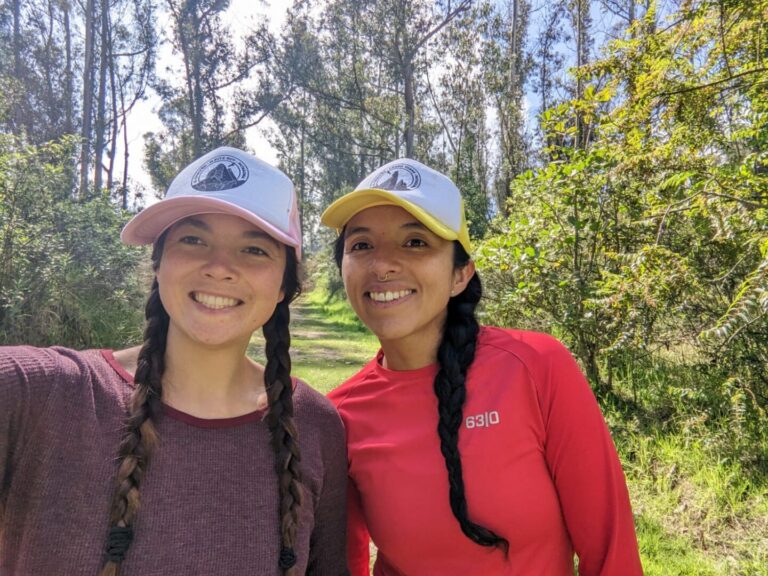Redefinir la Educación, El Arte Relacional, El Dolor Como Profe y La Aventura Sagrada
An Ecoversities Residency rambling report by sierra ying allen 🙂
REDEFINIENDO LA EDUCACIÓN
Redefining Education
“We follow the birds”
Growing up, this was the reason my parents gave for our annual migrations from Canada to Central America and back. I was born into a family that migrates. I have family spread across the globe, from Singapore to New York, Germany to China. My great-grandfathers crossed oceans to pursue opportunity in the Gum San (“gold hills”) of San Francisco. My father walked out after one year of college in his home state of California and drove north with no plan. He ended up in Bella Coola, a remote fishing village in BC and began a life of adventure more aligned with his values. As a teenager, my mother escaped the oppressive hustle of Hong Kong to begin life anew in the Canadian north, seeking space to breathe and freedom to be herself.
I have hardly spent more than six months in one place since I was three years old. I’ve been on the move all my life. Much of that has been based in either in the Yukon Territory and Costa Rica with plenty of travel in between. I understand this nomadic life as both a privilege and a handicap. I fluctuate between gratitude and guilt for the positive and negative impacts my travel has on myself and others. Travel is a huge part of my life and I’ve found it useful of late to stay with open curiosity around what it is coming to mean to me and my physical body, what it means to those and that which I love, how it influences those and that which I love, and how I can tell the stories and use the gifts of this ongoing life adventure.
“Seguimos a los pájaros”.
Mientras crecía, ésta era la razón que daban mis padres para nuestras migraciones anuales de Canadá a Centroamérica y viceversa. Nací en una familia que emigra. Tengo familia repartida por todo el mundo, de Singapur a Nueva York, de Alemania a China. Mis bisabuelos cruzaron océanos en busca de oportunidades en las Gum San (‘colinas de oro’ en cantonés) de San Francisco. Mi padre salió de la universidad después de un año en California, su estado natal, y condujo hacia el norte sin ningún plan. Acabó en Bella Coola, un remoto pueblo pesquero de Columbia Británica, y empezó una vida de aventuras más acorde con sus valores. Siendo adolescente, mi madre escapó del agobiante ajetreo de Hong Kong para empezar una nueva vida en el norte canadiense, buscando espacio para respirar y libertad para ser ella misma.
Casi no he pasado más de seis meses en un mismo lugar desde que tenía tres años. He estado en movimiento toda mi vida. Gran parte de mi vida la he pasado en el Territorio del Yukón y en Costa Rica, con muchos viajes en el medio. Entiendo esta vida nómada como un privilegio y una desventaja. Fluctúo entre la gratitud y la culpa por los efectos positivos y negativos que mis viajes tienen en mí y en los demás. Viajar es una parte importante de mi vida y últimamente me ha resultado útil mantenerme abierta a la curiosidad sobre lo que significa para mí y para mi cuerpo físico, lo que significa para aquellos y aquello que amo, cómo influye en aquellos y aquello que amo, y cómo puedo contar las historias y utilizar los dones de esta vida de aventura.
A story that comes up a lot in my co-explorations in the Ecoversities Alliance and other networks of folks re-imagining education, is a formative childhood experience I had of road-tripping with my family from northern Canada to Costa Rica. It was the wildest adventure of my 7 year-old life. Days after returning to my elementary school after the trip was over, I decided to quit and thus began my journey as an unschooler. School really lost its appeal after I had tasted such a radically more alive context for learning.
As I look back at this story, I realize that my body’s movement across geographies has profoundly shaped who I am/am becoming. With all its blessings and its curses this lifestyle has afforded, it’s been a foundational part of my education. The way this lands in my body as my truth and the awareness that each human body has a unique story with travel and migration leads me to a question I’ve been pondering:
Una historia que surge a menudo en mis exploraciones conjuntas en la Alianza Ecoversidades y otras redes de personas que están reimaginando la educación, es una experiencia formativa de la infancia que viví en un viaje por carretera con mi familia desde el norte de Canadá hasta Costa Rica. Fue la aventura más alocada de mis 7 años. Días después de regresar a mi escuela primaria tras el viaje, decidí dejarlo y así comenzó mi viaje como unschooler. La escuela realmente perdió su atractivo después de haber probado un contexto tan radicalmente más vivo para el aprendizaje.
Al recordar esta historia, me doy cuenta de que el movimiento de mi cuerpo a través de las geografías ha moldeado profundamente lo que soy y en lo que me estoy convirtiendo. Con todas sus bendiciones y maldiciones, este estilo de vida ha sido una parte fundamental de mi educación. La forma en que esto aterriza en mi cuerpo como mi verdad y la conciencia de que cada cuerpo humano tiene una historia única con los viajes y la migración me lleva a una pregunta que he estado reflexionando:
¿Qué pasaría si cada uno de nosotros reimagináramos y redefiniéramos el significado de la educación para nosotros mismos en el contexto de nuestras relaciones más importantes?
What if each of us re-imagined and redefined the meaning of education for ourselves in the context of our most important relationships?
I grew up in an institutional Christian context as a Seventh-Day Adventist. My relationship with the church has been challenging but unavoidably formative. Along my path of deconstruction/unlearning/reimagining, I’ve come to redefine Religion as my own ever-evolving personal way of relating to the divine, listening to the unseeable to support me in navigating a life of alignment and reconnection* to the Great Mystery which includes all of that which I’m woven into relationally. The root of the word Religion comes from the Latin words religio or religare meaning ‘to bond’, to ‘re-ligament’ or ‘reconnect’. So I’d like to propose each of us (and/or groups of us) taking the liberty of redefining Religion to include the structures, worldviews, rituals, practices, mindsets, or communities that support us in reconnecting, in our unique contexts, with Source, God, Beauty, Truth, Mystery, Reality, Oneness, the Tao, the Fabric of Existence or whatever term resonates for you.
In a similar way, I’m proposing to radically redefine Education as an ever-evolving frame that supports us in understanding more of who we are, in becoming more human with more capacity to be present to, express and actualize our unique gifts. The root of the word Education comes from the latin words educāre and educĕre meaning, respectively, “guiding’ or ‘molding’ and ‘revealing’ or ‘exposing’ from the inside out. So again, I’d like to propose that each of us take the liberty of redefining Education for ourselves to include whatever structures, relationships, places, perspectives, or actions that support us in becoming more of who we truly are; discovering what it means to be more human and more ourselves, and learning to act from that place of knowing in our specific relational contexts and ecosystems. It seems to me, the present-day concepts of Religion and Education are institutionalized approaches to meeting two fundamental human needs as described by Gabor Maté, physician and author who has greatly influenced modern science around childhood development, trauma and human wellbeing.
Crecí en un contexto cristiano institucional como adventista del Séptimo Día. Mi relación con la Iglesia ha sido difícil pero inevitablemente formativa. A lo largo de mi camino de deconstrucción/desaprendizaje/reimaginación, he llegado a redefinir la religión como mi propia forma personal, en constante evolución, de relacionarme con lo divino, escuchando lo invisible para apoyarme en la navegación de una vida de alineación y reconexión* con el Gran Misterio que incluye todo aquello en lo que estoy entretejida relacionalmente. La raíz de la palabra Religión viene de las palabras latinas religio o religare que significan ‘unir’, ‘re-ligar’ o ‘reconectar’. Así que me gustaría proponer que cada uno de nosotros (y/o grupos de nosotros) nos tomáramos la libertad de redefinir la Religión para incluir las estructuras, visiones del mundo, rituales, prácticas, mentalidades o comunidades que nos ayudan a reconectar, en nuestros contextos únicos, con la Fuente, Dios, la Belleza, la Verdad, el Misterio, la Realidad, la Unidad, el Tao, el Tejido de la Existencia o cualquier término que resuene para ti.
Del mismo modo, propongo redefinir radicalmente la Educación como un marco en constante evolución que nos ayuda a comprender mejor quiénes somos, a convertirnos en más humanos con más capacidad para estar presentes, expresar y actualizar nuestros dones únicos. La raíz de la palabra Educación viene de las palabras latinas educāre y educĕre que significan, respectivamente, “guiar” o “moldear” y “revelar” o “exponer” desde dentro hacia fuera. Así que, de nuevo, me gustaría proponer que cada uno de nosotros se tome la libertad de redefinir la Educación para nosotros mismos, de modo que incluya todas las estructuras, relaciones, lugares, perspectivas o acciones que nos ayuden a llegar a ser más de lo que realmente somos; a descubrir lo que significa ser más humanos y más nosotros mismos, y a aprender a actuar desde ese lugar de conocimiento en nuestros contextos relacionales y ecosistemas específicos.
Me parece que los conceptos actuales de religión y educación son enfoques institucionalizados para satisfacer dos necesidades humanas fundamentales descritas por Gabor Maté, médico y escritor que ha influido enormemente en la ciencia moderna sobre el desarrollo infantil, el trauma y el bienestar humano.
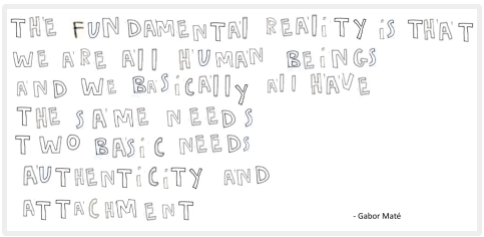
I’m positing that Religion is about Attachment and Education is about Authenticity. Attachment is our need to feel belonging, a sense of loving and being loved. Authenticity is the need to know ourselves, our individual bodies, to express and manifest who we are.
This could be one way of describing what’s happening in the Ecoversities Alliance and so many other aligned movements today. Finding a plurality of new and ancient ways to meet these fundamental human needs in more organic, contextual, regenerative ways. This is a tangent for another time… if it resonates, please reach out to me to have a conversation about it!
Sostengo que la religión tiene que ver con el apego y la educación con la autenticidad. El apego es nuestra necesidad de sentir que pertenecemos a algo, de amar y ser amados. La autenticidad es la necesidad de conocernos a nosotros mismos, a nuestros cuerpos individuales, de expresar y manifestar quiénes somos.
Esta podría ser una forma de describir lo que está ocurriendo en la Alianza Ecoversidades y en tantos otros movimientos alineados en la actualidad. Encontrar una pluralidad de formas nuevas y antiguas de satisfacer estas necesidades humanas fundamentales de maneras más orgánicas, contextuales y regenerativas. Esta es una tangente para otro momento… si te resuena, ¡por favor, ponte en contacto conmigo para tener una conversación sobre ello!
Por ahora, para divertirnos, me gustaría probar algunos ejercicios de “¿Qué pasaría si?” y tantear algunas nuevas definiciones de Educación:
For now, for fun, I’d like to try some “What If?” exercises and feel out some new definitions of Education:
Education is conventionally defined as, “the process of receiving or giving systematic instruction, especially at a school or university”.
What if education was defined as… a series of experiences that destabilize my sense of right and wrong and humble me to the complexity of life?
What if education was defined as…. responding to the mystery that guides my intuition?
What if education was defined as… taking on new roles in service of my community?
What if education was defined as… going on the adventure when it beckons?
What if education was defined as… following threads relational aliveness?
What if education was defined as… movement in response to pain?
What if education was defined as… following the birds?
Try it yourself! What if education was defined as… [fill in the blank]
My personal operating definition of Education is some combination of the above and this Educational path is what serendipitously led me to my first time visiting the beautiful territory we know of as Ecuador.
La educación se define convencionalmente como “el proceso de recibir o impartir instrucción sistemática, especialmente en una escuela o universidad”.
¿Y si la educación se definiera como… una serie de experiencias que desequilibran mi sentido del bien y del mal y me hacen humilde ante la complejidad de la vida?
¿Y si la educación se definiera como… una respuesta al misterio que guía mi intuición?
¿Y si la educación se definiera como… asumir nuevos papeles al servicio de mi comunidad?
¿Y si la educación se definiera como… lanzarse a la aventura cuando ésta llama?
¿Y si la educación se definiera como… seguir los hilos de la vitalidad relacional?
¿Y si la educación se definiera como… movimiento en respuesta al dolor?
¿Y si la educación se definiera como… seguir a los pájaros?
Inténtelo usted mismo. ¿Y si la educación se definiera como… [rellene el espacio en blanco]?
Mi definición operativa personal de Educación es alguna combinación de las anteriores y este camino Educativo es lo que serendipitariamente me llevó a visitar por primera vez el hermoso territorio que conocemos como Ecuador.
RESIDENCIA EN LOS ARTES RELACIONALES
A residency in relational arts
With many friends from Ecuador (many of whom I’ve met through the Ecoversities Alliance) and many others who have visited and loved it, I’ve always felt an attraction to the ‘middle of the earth’ as my dear Ecuadorian friend and host during this residency, Andre Gonzalez Andino, likes to call it. With its high mountains (“Apus” or “grandparents” as Andre calls them) and proximity to the equator, it’s the closest place on earth to the sun.
Con muchos amigos de Ecuador (muchos de los cuales he conocido a través de la Alianza Ecoversidades) y muchos otros que lo han visitado y amado, siempre he sentido una atracción por la “mitad de la tierra” como le gusta llamarla a mi querido amigo ecuatoriano y anfitrión durante esta residencia, André González Andino. Con sus altas montañas (“Apus” o “abuelos”, como las llama André) y su proximidad al ecuador, es el lugar del planeta más cercano al sol.
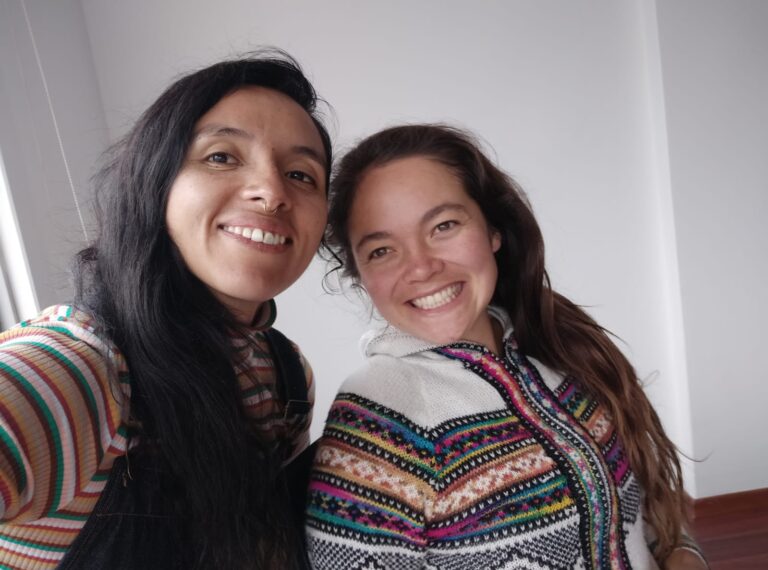
In early 2023, the opportunity presented itself to finally visit Ecuador. Despite being an avid traveler, the choice to travel to a place I’ve never been before is not one I take lightly. I travel for people and the more new places I travel to, the more meaningful connections I make and the more I feel stretched to keep all the relational threads alive.
At the time, I was in Costa Rica, with my usual lack of future plans. We were a couple of months into planning the online Reimagining Education Conference with my incredible friends and co-organizers, among them Andre and Salo, both Ecuadorians living in Quito. Andre and her partner Jero were training for a mega climbing trip with their mountain climbing Ecoversity project, Siguiendo Pasos Andinos, and as a long-time rock climber myself, it felt relevant to explore the crossroads between the world of rock climbing and radically reimagining higher education. To seal the deal further, there would be a Mushuk Away (the Ecuadorian alternative education network) gathering hosted by my other dear Ecuadorian friend, Marco and his family who I had not yet met. Last but not least, I was excited to meet another Ecoversities friend who I had worked with online, Juan Jose, a brilliant permaculturist with his own land regeneration Ecoversity project, La Conchita.
What unfolded in this trip had far too many meaningful layers of connection to put into words, but what is clear is that I was to be immersed into the field of the relational arts.
A principios de 2023, se presentó la oportunidad de visitar por fin Ecuador. A pesar de ser un ávido viajero, la decisión de viajar a un lugar en el que nunca he estado antes no la tomo a la ligera. Viajo por la gente y cuantos más lugares nuevos visito, más conexiones significativas establezco y más me siento obligada a mantener vivos todos los hilos relacionales.
En ese momento, estaba en Costa Rica, con mi habitual falta de planes de futuro. Llevábamos un par de meses planeando la Conferencia en línea Reimaginando la Educación con mis increíbles amigos y coorganizadores, entre ellos André y Salo, ambos ecuatorianos residentes en Quito. Andre y su compañero Jero se estaban entrenando para un mega viaje de escalada con su proyecto Ecoversity de alpinismo, Seguiendo Pasos Andinos, y como escalador que soy desde hace mucho tiempo, me pareció pertinente explorar la encrucijada entre el mundo de la escalada y la reimaginación radical de la educación superior. Para cerrar aún más el trato, habría una reunión de Mushuk Away (la red ecuatoriana de educación alternativa) organizada por mi otro querido amigo ecuatoriano, Marco, y su familia, a quienes aún no conocía. Por último, pero no por ello menos importante, me entusiasmaba conocer a otro amigo de Ecoversidades con el que había trabajado en línea, Juan José, un brillante permacultor con su propio proyecto de regeneración de tierras de Ecoversidades, La Conchita.
Lo que se desarrolló en este viaje tenía demasiadas capas significativas de conexión para ponerlas en palabras, pero lo que está claro es que me iba a sumergir en el campo de las artes relacionales.
What is relational art? To me, it’s one of those terms that sound pretty and can and should be defined in as many ways as there are definers. It highlights the agency and creativity we have to pursue beauty, aliveness and harmony with everything we are in contact with – our bodies, the elements, the land, each other and everything else in our corner of the web of life. The sacred opportunity we have to experiment with, learn, grow in the act of shaping and being shaped, by the relational web we find ourselves a part of. Personally, this journey has been very textured and humbling, much of it centered around unlearning colonized, wounded, dualistic mindsets of separation. Truly opening myself with care and beginning to peel back layers of conditioning and rigidity is a consistent, beautiful, messy, awkward process.
On this journey of re-imagining learning and life I’ve come to realize the relationality is at the core of actually shifting away from factory or institutional models of learning and towards what we know in our hearts is possible beyond the confines of modernity, beyond the human, beyond what we could possibly imagine or create.
The idea is that we can all practice relational art. Andre is the first person I’ve heard describe themselves as a relational artist, which I love because it’s so true! This framing has really helped me become more observant of how others practice their art which comes with the immense joy of witnessing so much beauty. Additionally, it’s been thrilling to understand myself as an art-piece-in-the-making, being shaped by the many artists both human and beyond, and most awesome of all, by the Great Mysteries themselves. You could say that everything is relational and that everything we do can be done artistically, that is, with intention and purpose. What if education was defined as the process of becoming both the relational artist and the art?
¿Qué es el arte relacional? Para mí, es uno de esos términos que suenan muy bien y que pueden y deben definirse de tantas maneras como definidores haya. Destaca la capacidad y la creatividad que tenemos para buscar la belleza, la vitalidad y la armonía con todo aquello con lo que estamos en contacto: nuestros cuerpos, los elementos, la tierra, los demás y todo lo que nos rodea.
La sagrada oportunidad que tenemos de experimentar, aprender y crecer en el acto de formar y ser formados por la red relacional de la que formamos parte. Personalmente, este viaje ha sido muy variado y humilde, gran parte de él centrado en desaprender mentalidades colonizadas, heridas y dualistas de separación. Abrirme de verdad con cuidado y empezar a quitar capas de condicionamiento y rigidez es un proceso constante, hermoso, desordenado e incómodo.
En este viaje de reimaginar el aprendizaje y la vida me he dado cuenta de que la relacionalidad está en el centro del cambio real de los modelos institucionales o de fábrica de aprendizaje hacia lo que sabemos en nuestros corazones que es posible más allá de los confines de la modernidad, más allá de lo humano, más allá de lo que podríamos imaginar o crear.
La idea es que todos podemos practicar el arte relacional. Andre es la primera persona a la que he oído describirse como artista relacional, ¡y me encanta porque es muy cierto! Este encuadre me ha ayudado a ser más observadora de cómo otros practican su arte, lo que conlleva la inmensa alegría de ser testigo de tanta belleza. Además, ha sido emocionante entenderme a mí misma como una obra de arte en proceso de creación, moldeada por muchos artistas, tanto humanos como del más allá, y lo más impresionante de todo, por los propios Grandes Misterios. Podría decirse que todo es relacional y que todo lo que hacemos puede hacerse artísticamente, es decir, con intención y propósito. ¿Qué pasaría si la educación se definiera como el proceso de convertirse en un arte?
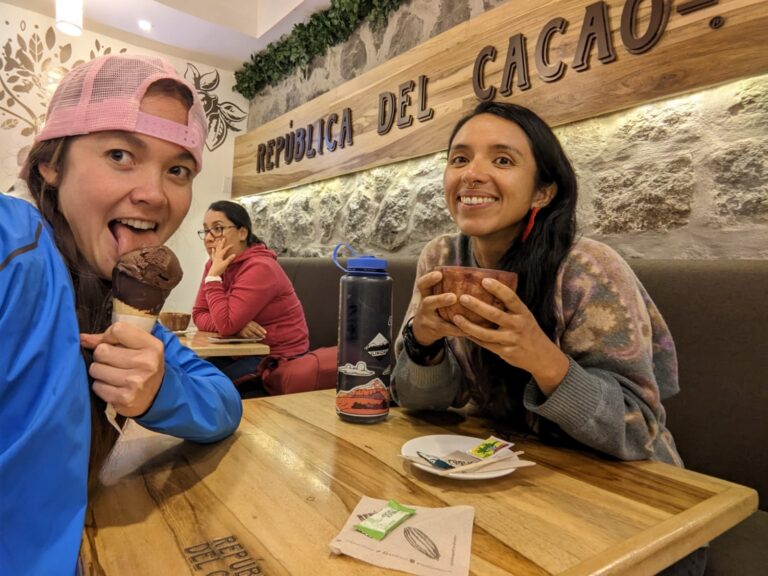
In Ecuador, I experienced myself being shaped by so many beautiful artists, the territory in all her many colors and textures, the unique ecosystem with its familiar and unfamiliar mushroom and moss friends, plant and tree kin, all flourishing within the moody weather patterns of the high Andes. Its oblique ancestral stories and geographic memory pointing to wisdom that carries through the ages, held firm by the land and ever-evolving languages. And of course, my dear human friends, our common dreams, inquiries, and shared experiences.
So many resonant topics of conversation emerged between going out to eat delicious Ecuadorian food, staying in and previewing the ecoversities film festival, searching for ancient petroglyphs and visiting sacred Incan and pre-Incan sites around the city, working out, running, mushroom picking, cooking, co-working (or tragozando “joy-working” and Salo calls it), soaking in beautiful hot springs, going out dancing, long distance road tripping on extremely adventurous roads, swapping massages, visits to various medical facilities (yes, I got very sick, more on that later), eating the best vegan ice cream ever, and of course, rock climbing.
En Ecuador, me sentí moldeada por tantos artistas hermosos, el territorio en todos sus colores y texturas, el ecosistema único con sus familiares y desconocidos amigos hongos y musgos, plantas y árboles, todos floreciendo dentro de los cambiantes patrones climáticos de los altos Andes. Sus oblicuas historias ancestrales y su memoria geográfica apuntan a una sabiduría que perdura a través de los tiempos, mantenida firme por la tierra y las lenguas en constante evolución. Y, por supuesto, mis queridos amigos humanos, nuestros sueños comunes, nuestras preguntas y nuestras experiencias compartidas.
Entre salir a comer deliciosa comida ecuatoriana, quedarnos en casa y asistir al festival de cine ecoversities, buscar petroglifos antiguos y visitar lugares sagrados incas y preincas de la ciudad, hacer ejercicio, correr, recoger setas, cocinar… surgieron muchos temas de conversación resonantes, hacer ejercicio, correr, recoger setas, cocinar, trabajar en equipo (o tragozando, como lo llama Salo), sumergirme en hermosas aguas termales, salir a bailar, recorrer largas distancias por carreteras extremadamente aventureras, intercambiar masajes, visitar diversos centros médicos (sí, me puse muy enferma, más sobre esto más adelante), comer el mejor helado vegano de la historia y, por supuesto, escalar en roca.
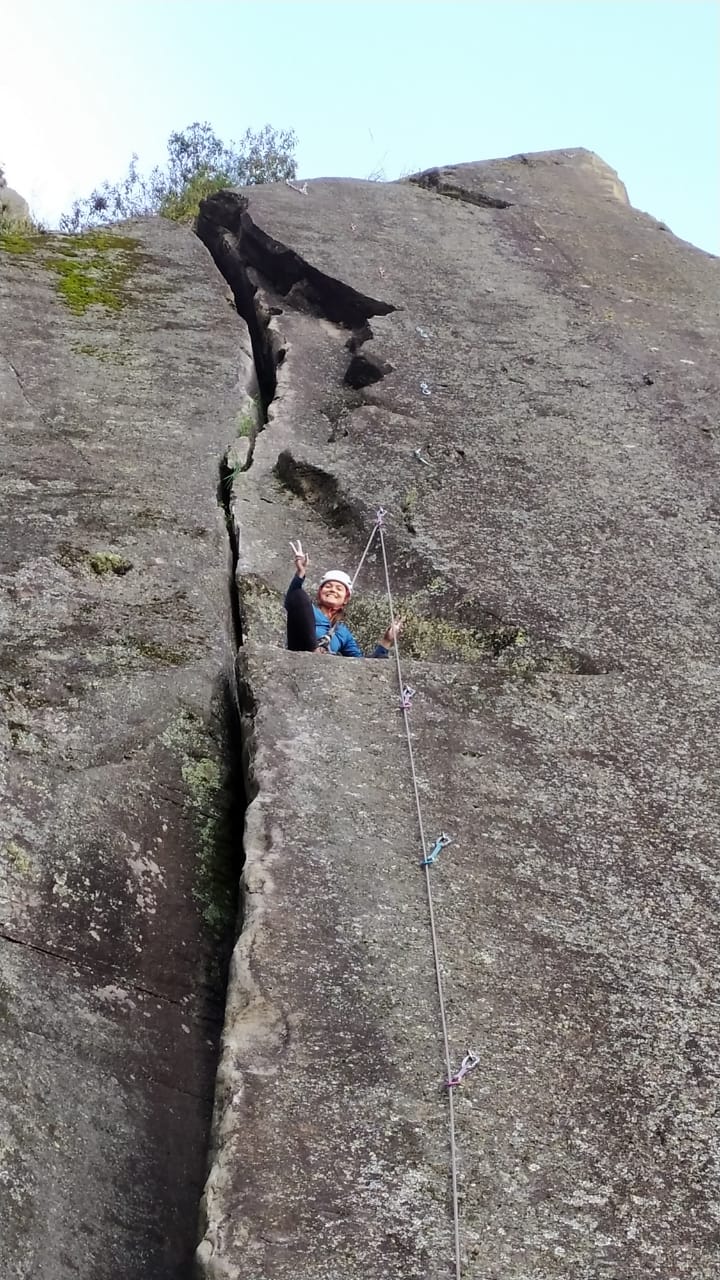
POR SI ACASO
Just in case (but it doesn’t really translate)
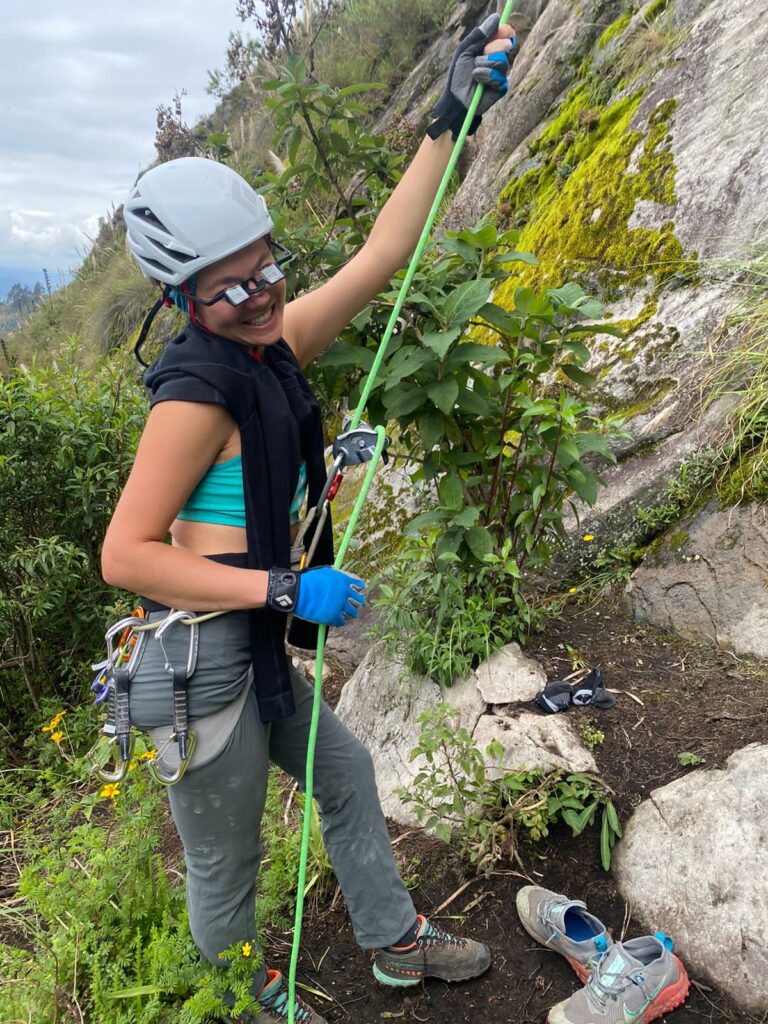
One beautiful awareness that surfaced as a gift from the Ecuadorian context was that of embracing uncertainty. I found an embodied way of being there that is not common in the cultural contexts I grew up in. The distinction is something like, shaping the way of being around increasing capacity to dance with the unknown instead of shaping the way of being around increasing capacity to control or tame uncertain reality into something predictable and safe.
There are so many threads that connect me to this notion. For now, I’ll use the term Sacred Adventure to gesture towards what feels important.
Una hermosa conciencia que surgió como un regalo del contexto ecuatoriano fue la de abrazar la incertidumbre. Allí encontré una forma de ser que no es común en los contextos culturales en los que crecí. La distinción es algo así como dar forma a la manera de ser en torno a la creciente capacidad de bailar con lo desconocido, en lugar de dar forma a la manera de ser en torno a la creciente capacidad de controlar o domar la realidad incierta para convertirla en algo predecible y seguro.
Hay muchos hilos que me unen a esta noción. Por ahora, utilizaré el término Aventura Sagrada para referirme a lo que me parece importante.
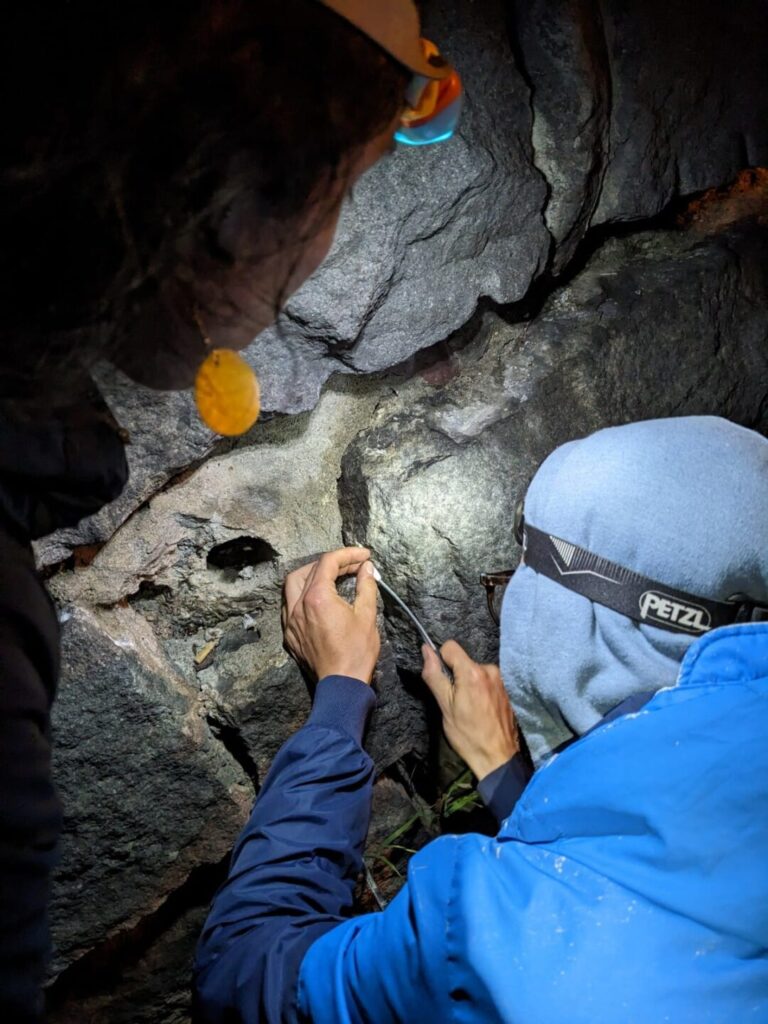
Adventure is another one of those words that connote different things for different people, rightfully. What is the essence of true adventure? Why do we seek it? Why do we avoid it? What value does it hold for us as humans? Does it have a place beyond the human realm?
My version of adventure comes from a place of acceptance that we will never truly understand or know what the future holds, we can never fully eliminate the risk as much as we prepare, study, understand, technologize, philosophize, and privatize.
It’s to be present and humble to this predicament AND to continue to show up, curious, seeking, sensemaking, striking out into that unknown, letting ourselves become shaped by it. Being the relational art. Adventure, I would say, is a fundamental human need. We are wired to seek care, comfort, and a sense of safety. We are equally wired to seek the edges, exploration, experimentation. One of the factors that I think has heavily influenced the culture in Ecuador towards this dance with the unknown is the weather. Weather forecasts were treated as a joke in the Andes. There could be blue sky without a cloud in sight one moment, and 20 minutes later, a downpour. Inconvenient weather did not deter anyone from going about their plans for the day, the phrases “vamos viendo” which translates to “let’s see as we go” as well as “por si acaso” which means something like “just in case, you never know” were so commonly used, showing a highly level of ease with life-as-adventure. I experienced there a way of being that is practiced in giving space to the miracle, the magic and the mystery.
One story from the trip illustrates what I’m trying to talk about.
Aventura es otra de esas palabras que connota cosas diferentes para personas diferentes, y con razón. ¿Cuál es la esencia de la verdadera aventura? ¿Por qué la buscamos? ¿Por qué la evitamos? ¿Qué valor tiene para nosotros como seres humanos? ¿Tiene un lugar más allá del reino humano?
Mi versión de la aventura parte de la aceptación de que nunca entenderemos ni sabremos realmente lo que nos depara el futuro, nunca podremos eliminar por completo el riesgo por mucho que nos preparemos, estudiemos, comprendamos, tecnologicemos, filosofemos y privaticemos.
Se trata de estar presentes y ser humildes ante este predicamento Y seguir apareciendo, curiosos, buscando, generando sensaciones, adentrándonos en lo desconocido, dejándonos moldear por ello. Ser el arte relacional. Yo diría que la aventura es una necesidad humana fundamental. Estamos programados para buscar atención, comodidad, una sensación de seguridad. Pero también buscamos la frontera, la exploración, la experimentación.
Uno de los factores que creo que ha influido mucho en la cultura de Ecuador hacia esta danza con lo desconocido es el clima. En los Andes, las previsiones meteorológicas se tomaban a broma. Podía haber un cielo azul sin una nube a la vista en un momento, y 20 minutos después, un aguacero. El tiempo incómodo no disuadía a nadie de seguir con sus planes para el día, las frases “vamos viendo”, que se traduce como “veamos sobre la marcha”, así como “por si acaso”, que significa algo así como “por si acaso, nunca se sabe”, eran de uso muy común, mostrando un alto nivel de soltura con la vida como aventura. Experimenté allí una forma de ser que se practica dando espacio al milagro, la magia y el misterio.
Una anécdota del viaje ilustra lo que quiero decir.
About 3 weeks into my time in Ecuador, we went on a climbing road trip to the south, to a quaint town called Cojitambo set below a gorgeous sacred rock monolith complete with Incan ruins, picapiedras (rock miners) and rock climbers. The only issue was that a kilometers-long section of the main highway had fallen away during a recent earthquake, burying a neighbourhood and rendering the highway impassable indefinitely. Asking around we found some vague directions that would lead us on a slow but beautiful detour on steep, small, dirt mountain roads.
On the return trip back to Quito, we headed back the way we came. What we didn’t expect was that since we’d been through a week earlier, road work had been done followed by a huge dump of rain which turned some of the steep sections of the road into a treacherous slip-and-slide. The problem area was near one of the indigenous villages and a huge number of villagers had come out with their picks and shovels, trying to help the poor travelers through. There were other vehicles already abandoned, stuck in various conditions. As we approached, some of the men shook their heads and stated firmly that despite our 4wd, high clearance vehicle, there was no chance we could make it through. Turning back was so unappealing, however, so we stubbornly decided to give it a try. It didn’t look too bad….
A las tres semanas de estar en Ecuador, hicimos un viaje de escalada por carretera hacia el sur, a un pintoresco pueblo llamado Cojitambo, situado bajo un precioso monolito de roca sagrada, con ruinas incas, picapiedras (mineros de roca) y escaladores. El único problema era que un tramo kilométrico de la carretera principal se había desprendido durante un terremoto reciente, sepultando un barrio y dejando la carretera intransitable indefinidamente. Preguntando por ahí encontramos unas vagas indicaciones que nos llevarían por un lento pero hermoso desvío por empinadas y pequeñas carreteras de montaña de tierra.
En el viaje de vuelta a Quito, regresamos por donde habíamos venido. Lo que no esperábamos era que, desde que habíamos pasado por allí una semana antes, se habían realizado obras en la carretera, seguidas de una enorme lluvia que convirtió algunos tramos empinados de la carretera en un traicionero tobogán.La zona problemática estaba cerca de una de las aldeas indígenas y un gran número de aldeanos habían salido con sus picos y palas, intentando ayudar a los pobres viajeros a pasar.Había otros vehículos ya abandonados, atascados en diversas condiciones.A medida que nos acercábamos, algunos de los hombres sacudieron la cabeza y afirmaron con firmeza que, a pesar de nuestro vehículo 4×4 de gran altura, no había ninguna posibilidad de que pudiéramos pasar.Sin embargo, la idea de dar la vuelta era muy poco atractiva, así que decidimos intentarlo. No parecía tan malo…
After an hour of us and the villagers pushing the 2800kg land cruiser up the slipperiest sections, and finally getting through only to be turned around by another section of road that had been blocked by other misfortuned travelers, we admitted defeat and turned around. What struck me as distinct about this experience and the behaviour of the villagers was that despite “KNOWING” that we wouldn’t be able to get through, they still fully supported our decision to try, even helping us push! Was it out of respect? Openness to the possibility of a miracle?
This brings me to the concept of Deferential Knowing, a knowing that is alive when there is a healthy connection to the complexity and wisdom of the more-than-human, where the human is present to the limits of our capacity to fully know. I experienced in Ecuador real life examples of a humble knowing that I register as a clue towards how to heal our relationship to the world.
Living into the spirit of the Sacred Adventure has supported me the most when the inevitable unpleasant unexpecteds come my way. Which was a blessing when a huge part of my trip became navigating the adventure of physical unwellness.
Después de una hora en la que los aldeanos y nosotros empujamos el land cruiser de __ lb por los tramos más resbaladizos, y finalmente lo conseguimos sólo para darnos la vuelta por otro tramo de carretera que había sido bloqueado por otros viajeros desafortunados, admitimos la derrota y dimos la vuelta.Lo que más me llamó la atención de esta experiencia y del comportamiento de los aldeanos fue que, a pesar de “SABER” que no íbamos a poder pasar, apoyaron plenamente nuestra decisión de intentarlo, ¡incluso nos ayudaron a empujar!¿Fue por respeto? ¿Apertura a la posibilidad de un milagro?
Esto me lleva al concepto de conocimiento diferencial, un conocimiento que está vivo cuando existe una conexión saludable con la complejidad y la sabiduría de lo más-que-humano, donde lo humano está presente hasta los límites de nuestra capacidad de conocer plenamente. En Ecuador experimenté ejemplos reales de un conocimiento humilde que considero una pista para sanar nuestra relación con el mundo.
Vivir en el espíritu de la Aventura Sagrada es lo que más me ha ayudado cuando me han surgido los inevitables imprevistos desagradables.Lo cual fue una bendición cuando una gran parte de mi viaje se convirtió en navegar por la aventura del malestar físico.
EL LUJO DE PODER SENTARSE
The luxury (and curse) of sitting
A week after arriving in Ecuador my stomach began to churn and I started to feel faint. After two weeks of too many trips to the bathroom, changed plans, medical visits, tests, antibiotics and parasite medication and moving veeeeery slowly I began to recover, enough to thoroughly enjoy the road trip to Cojitambo. After a week of climbing at my limit (the climbing was incredible) and then sitting in the back of the Land Cruiser for 12 hours on rough roads (with the one stop with pushing the truck uphill through the mud), then upon return to the city, diving directly into long hours executing final preparations for the Reimagining Education Conference, THEN sitting in front of a computer facilitating the conference over Zoom for 4 days, my back (which has given me issues since a major injury 8 years ago) began to scream at me, louder than it ever has before. I woke up the next morning and I couldn’t walk. I could barely move, breathing hurt. It was a familiar pain but so much worse than I’d had it before.
To make a long painful saga short, the rest of my trip was focused on trying to alleviate the pain, seeing so many different medical professionals (learning that medical care in Ecuador is better than in Canada), ending up in the emergency (after stubbornly trying to tough it out for too many days and Andre and Jero talking me into it), taking all the pharmaceuticals they threw at me (they didn’t help much) and finally discovering that I had inflamed nerves related to herniated disks in my spine that take about 6 weeks to calm down, I had no choice but to stop everything and focus on my physical well being from one day to the next. During this time I was thrust into “Painversity” and learned so many incredible life lessons including truly trusting and listening to the wisdom of my body, developing a more respectful relationship with myself and my own needs, learning to ask for and receive help, returning to breath for healing and presence and discovering the miracles of the simple things, including the privilege of being able to sit.
Una semana después de llegar a Ecuador se me revolvió el estómago y empecé a sentirme débil.Después de dos semanas de demasiadas idas al baño, cambios de planes, visitas médicas, pruebas, antibióticos y antiparasitarios y de moverme muy muy despacio, empecé a recuperarme, lo suficiente como para disfrutar a tope del viaje por carretera a Cojitambo.Después de una semana de escalar a mi límite (la escalada fue increíble) y luego sentarse en la parte trasera del Land Cruiser durante 12 horas en carreteras en mal estado (con una parada con empujar el camión cuesta arriba a través del barro), a continuación, a su regreso a la ciudad, sumergirse directamente en largas horas de ejecución de los preparativos finales para la Conferencia de Educación Reimagining, LUEGO sentado frente a un ordenador facilitando la conferencia sobre Zoom durante 4 días, mi espalda (que me ha dado problemas desde una lesión grave hace 8 años) begaDespués de una semana de escalar a mi límite (la escalada fue increíble) y luego sentarse en la parte trasera del Land Cruiser durante 12 horas en carreteras en mal estado (con una parada con empujar el camión cuesta arriba a través del barro), a continuación, a su regreso a la ciudad, sumergirse directamente en largas horas ejecutando los preparativos finales para la Conferencia de Educación Reimagining,
DESPUÉS, sentada delante de un ordenador facilitando la conferencia a través de Zoom durante 4 días, mi espalda (que me ha dado problemas desde una lesión importante hace 8 años) empezó a gritarme, más fuerte que nunca. Me desperté a la mañana siguiente y no podía andar. Apenas podía moverme, respirar me dolía. Era un dolor familiar pero mucho peor que el que había tenido antes.Para abreviar una saga larga y dolorosa, el resto de mi viaje se centró en intentar aliviar el dolor, ver a muchos profesionales médicos diferentes (aprendiendo que la atención médica en Ecuador es mejor que en Canadá), acabar en urgencias (después de intentar resistirme obstinadamente durante demasiados días y de que André y Jero me convencieran), tomar todos los fármacos que me echaron (no ayudaron mucho) y finalmente descubrir que tenía nervios inflamados relacionados con hernias discales en la columna vertebral que tardan unas 6 semanas en calmarse, no tuve más remedio que parar todo y centrarme en mi bienestar físico de un día para otro. Durante este tiempo me vi inmersa en la “Painversity” y aprendí tantas lecciones de vida increíbles, como confiar y escuchar de verdad la sabiduría de mi cuerpo, desarrollar una relación más respetuosa conmigo misma y mis propias necesidades, aprender a pedir y recibir ayuda, volver a la respiración para sanar y estar presente y descubrir los milagros de las cosas sencillas, incluido el privilegio de poder sentarme.
TEJIDX POR LAS AMERICAS
Woven by the Americas
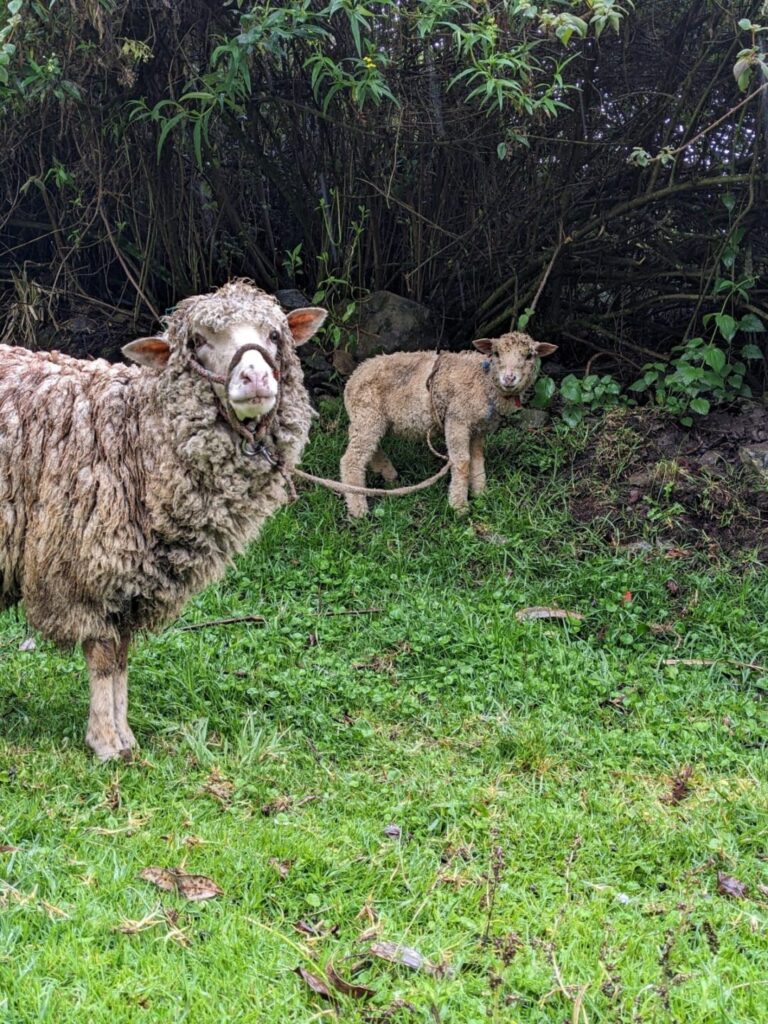
As I write this months later back home in northwest Turtle Island (Yukon Territory) I reflect on how much I don’t know about the bigger story that’s unfolding at this time on the planet. As many of us, I feel the complexity of our times, of being human, of finding solace in times of trouble. As a person with mixed ancestries, histories, geographies and cultural perspectives, I feel that I am one “not special but needed”, as Adrienne Maree Brown puts it, piece in a giant web of reconnection or restoration that is being woven. Something about going to Ecuador felt like letting myself continue to be woven by the Americas, being blended into the medicine that is idea exchange, shared moments, flavours, sensitivities, thoughts, insights, accents, questions, longings. One small thread that contributes to some process of cross-continental-cultural healing that I will never really understand.
Andre’s word of reflection continues to weave this sense of this relational web that is being woven:
As I write this months later back home in northwest Turtle Island (Yukon Territory) I reflect on how much I don’t know about the bigger story that’s unfolding at this time on the planet. As many of us, I feel the complexity of our times, of being human, of finding solace in times of trouble. As a person with mixed ancestries, histories, geographies and cultural perspectives, I feel that I am one “not special but needed”, as Adrienne Maree Brown puts it, piece in a giant web of reconnection or restoration that is being woven. Something about going to Ecuador felt like letting myself continue to be woven by the Americas, being blended into the medicine that is idea exchange, shared moments, flavours, sensitivities, thoughts, insights, accents, questions, longings. One small thread that contributes to some process of cross-continental-cultural healing that I will never really understand.
Andre’s word of reflection continues to weave this sense of this relational web that is being woven:
Andre's Reflection
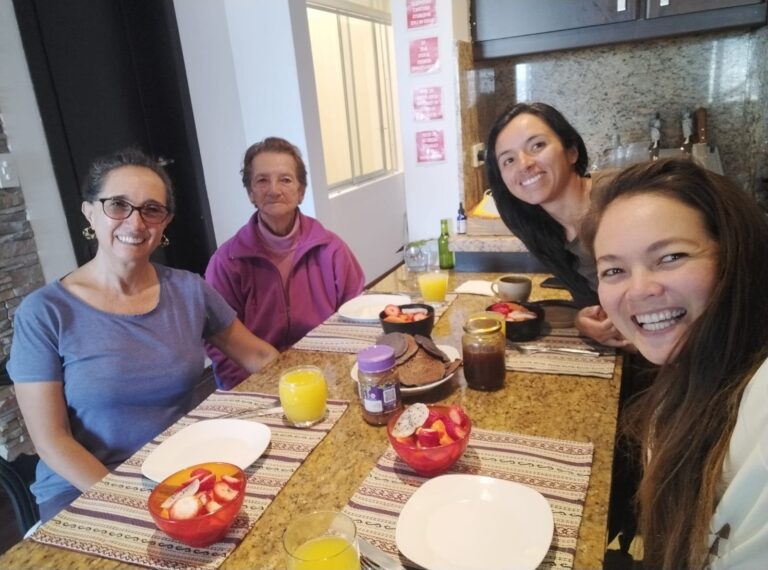
There are so many nuances when we come together, in intentionally shared space. Each one of us has his or her personal motivation, intentions, reasons, and so many elements that come together to give meaning to our existence. We come together and we assemble a “fanesca” of deep feelings, of shared paths that are taking on new colors and naming them in other ways. This resonance with others helps us reflect on what we are doing, repaint, clean the dust out and move everything again. Maybe it is necessary to change the house, move the rooms, check the pipes, the encounter with other people opens me to those nice possibilities. To literally receive someone in one’s house, they occupy a physical place and by sharing day to day, ideas, thoughts, they also enter our heart and life.
Sierra María de las Mercedes came to accompany me for a few weeks of my life, and got to know who I am, who I hang out with, what I look for, what I eat, where I poop, where I wash my clothes, who visits me, who I visit, how I refer to people, my bad moods, my good moods, my love-teasing, my family, my grandmother, my mountains, how intense and loving the sun is in these parts.
The relational adventure may be in immersing oneself in the other to see what is found in the exploration. These were some of the shared topics we found with Sierra, Juanjo, Salomón, Jero, Raúl, Matthew and others we walked with us these April days in Quito, San Juan, Cojitambo:
Hay tantos matices al momento de juntarnos, de compartir espacios intencionadamente. Cada unx tiene su motivación personal, las intenciones, las razones, tantos elementos que se juntan para dar sentido a la existencia. Nos juntamos y armamos una fanesca de sentires profundos, de caminos compartidos que van tomando otros colores y nombrando de otras formas. La resonancia con las otras personas hacen revisar lo que camino, repintar, limpiar los polvos y volver a moverlo todo. Tal vez sea necesario cambiar de casa, mover los cuartos, revisar las tuberías, el encuentro con las otras personas me da esa linda posibilidad. De literalmente recibir a alguien en la casa, que ocupe un lugar físico y que al compartir la vida, las ideas, los pensamientos, también entre en el corazón y en la vida.
Sierra María de las Mercedes llegó a acompañarme unas semanas en la vida, a conocer quién soy, con quién ando, qué busco, qué cómo, dónde caco, donde lavo la ropa, quiénes me visitan, a quiénes visito, cómo me refiero a la gente, mis mal genios, mis buenos genios, mis burlas de amor, a mi familia, a mi abuela, a mis montañas, a lo intenso y amoroso que es el sol por estos lares.
La aventura relacional puede que esté en sumergirse el unx en el otrx para ver qué se encuentra en la exploración. Estos fueron unos esbozos que encontramos con Sierra, Juanjo, Salomón, Jero, Raúl, Matthew, algunxs de los que caminaron con nosotrxs estos días de abril en Quito, San Juan, Cojitambo.
Tanto más por aprender y compartir, soltar y confiar.
Regenerative Justice
Reimagining Leadership
Healing in Community
Digestion, Food, Healing
Why do we do what we do? What motivates our actions?
Alivelihoods – how do we become more intentional about our lives and livings together?
Romanticization of Indigenous ways of being
The Church and cultural violence and imposition
Intergenerational violence
Gender dynamics
Romantic Relationality
Gossip as Pedagogy
Relationships with Honesty
What are the masculine and feminine energies for us? Within us?
Regenerative justice
Pain as a Teacher
What is Adventure?
Rediscovery and readjustment to Change within
White privilege and Racism
Friendship as Romance
Dreams
Falling in love with Conflict
Climbing as Romance
…
Justicia Regenerativa
Reimaginar el liderazgo
Curación en comunidad
Digestión, Alimentación, Curación
¿Por qué hacemos lo que hacemos? ¿Qué motiva nuestras acciones?
Medios de vida: ¿cómo podemos ser más conscientes de nuestras vidas y de nuestra convivencia?
Romantización de las formas de ser indígenas
La Iglesia y la violencia cultural y la imposición
Violencia intergeneracional
Dinámicas de género
La relacionalidad romántica
El chisme como pedagogía
Relaciones con honestidad
¿Cuáles son para nosotros las energías masculina y femenina? ¿Dentro de nosotros?
Justicia regeneradora
El dolor como maestro
¿Qué es la Aventura?
Redescubrimiento y readaptación al Cambio interior
Privilegio blanco y racismo
La amistad como romance
Sueños
Enamorarse del conflicto
La escalada como romance
As the adventure and the conversations continue, I’d like to express gratitude for your taking the time to read this. It feels like an honour to be in community and have this space to share what’s mine to share. I feel so blessed with the moments I’ve been gifted, for the unraveling of the rugged individual version of myself and the settling into the greater complexity and beauty of the We. For the internal and external Mysteries, the opportunities for experimentation on this journey, all the relational art that has come before me that I get to add color and texture to, for the relational aliveness that guides us, that I experience each day and trust deeply. For the discomfort and gift in being in between, of feeling at home everywhere and nowhere all at once, for the gift and curse of the nomadic life, having to say goodbye to loved ones in order to say hello to others. For the fragmentation and the cracks. The awe and the wonder.
For the Sacred Adventure that brings me into contact with so much beauty that I get to with-ness. For the beauty that is painful. For the pain that is beautiful. For the wisdom of my body and its interconnection with all other bodies.
What if education is…. the result of a series of broken hearts? Reaching our limits and falling off the rock? Tearfully accepting the futility and vanity of trying to save the world and letting the world try to save us?
Being Oh, So, NOT alone in all of this?
A medida que la aventura y las conversaciones continúan, me gustaría expresar mi gratitud por tomarse el tiempo de leer esto. Es un honor estar en comunidad y tener este espacio para compartir lo que me pertenece. Me siento tan bendecida por los momentos que me han sido regalados, por el desenmarañamiento de la versión individual y áspera de mí misma y el asentamiento en la mayor complejidad y belleza del Nosotros. Por los Misterios internos y externos, las oportunidades de experimentar en este viaje, todo el arte relacional que me ha precedido y al que puedo añadir color y textura, por la vitalidad relacional que nos guía, que experimento cada día y en la que confío profundamente. Por la incomodidad y el don de estar en medio, de sentirse en casa en todas partes y en ninguna a la vez, por el don y la maldición de la vida nómada, de tener que decir adiós a los seres queridos para decir hola a los demás. Por la fragmentación y las grietas. Por el asombro y la maravilla.
Por la Aventura Sagrada que me pone en contacto con tanta belleza que llego a sentir. Por la belleza que es dolorosa. Por el dolor que es bello. Por la sabiduría de mi cuerpo y su interconexión con todos los demás cuerpos.
¿Y si la educación es…. el resultado de una serie de corazones rotos? ¿De alcanzar nuestros límites y caer de la roca? ¿De aceptar con lágrimas en los ojos la futilidad y la vanidad de intentar salvar al mundo y dejar que el mundo intente salvarnos a nosotros? ¿De estar Oh, Tan, NO solo en todo esto?
AGRADECIMIENTOS
Gratitudes
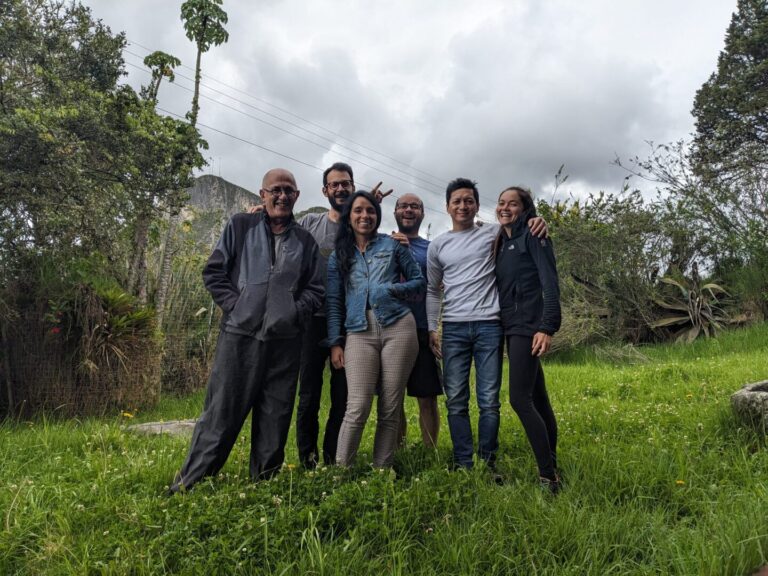
Thanks to the Ecoversities Alliance for being a home, a community, a compost bin, an ecosystem, a chaotic constellation of beautiful stars that I get to twinkle among.
Thanks to Archana, Angelica and Yeyo from the Ecoversities Pollinators, Exchanges and Residencies Circle for their support, listening and accompaniment in this journey. Without them I would not have gotten these words out of my head.
To Andrea for her beautiful relational artistry, love, friendship and co-dreaming.
Mil gracias a todes quienes fueron parte del tejido relacional de este viaje – especialmente Salo, Raul, Jero, Juanjo, Matthew, Doña Luz, Juan Gabriel, Margarita, Ceci, todes del Club de Montaña y los demás seres humanos y más que humanos increíbles con quienes tuve la bendición de conectar.
(A thousand thanks to all of those that made up the relational tapestry of this trip – especially Salo, Raul, Jero, Juanjo, Matthew, Doña Luz, Juan Gabriel, Margarita, Ceci everyone from the Mountain Club and all the rest of the human and more than humans that I was blessed to connect with.)
I have learned and continue to learn so much about how to be more interstitially human from all of you and hold you all always with respect, admiration and gratitude.
Gracias a la Alianza Ecoversidades por ser un hogar, una comunidad, una compostera, un ecosistema, una constelación caótica de hermosas estrellas entre las que me toca titilar.
Gracias a Archana, Angélica y Yeyo del Círculo de Polinizadores, Intercambios y Residencias de Ecoversities por su apoyo, escucha y acompañamiento en este viaje. Sin ellas no me habría sacado estas palabras de la cabeza.
A Andrea por su hermoso arte relacional, amor, amistad y co-sueño.
Mil gracias a todes quienes fueron parte del tejido relacional de este viaje – especialmente Salo, Raul, Jero, Juanjo, Matthew, Doña Luz, Juan Gabriel, Margarita, Ceci, todes del Club de Montaña y los demás seres humanos y mas que humanos increíbles con quienes tuve la bendición de conectar.
(Mil gracias a todos los que formaron el tapiz relacional de este viaje – especialmente a Salo, Raúl, Jero, Juanjo, Mateo, Doña Luz, Juan Gabriel, Margarita, Ceci todos los del Club de Montaña y el resto de seres humanos y más que humanos con los que tuve la bendición de conectar).
He aprendido y sigo aprendiendo mucho sobre cómo ser más humano intersticialmente de todos vosotros y os tengo a todos siempre con respeto, admiración y gratitud.
PS
One exciting collaboration that this Ecuador Residency really helped define is a new project we’re calling Adventure-versity! The idea emerged for an Ecoversity project centering adventure (in its many forms) through the years of playing and creating with the “bandita” that is myself, Eileen, Andre and Dan. Together we’re deep diving into the exploration of Adventure as Teacher, to create more possibility-space for ourselves and others to continue experiencing and sharing deep learning that happens in unstructured, enlivening in-person encounters around the world. Stay tuned!!!
Una colaboración emocionante que esta Residencia en Ecuador realmente ayudó a definir es un nuevo proyecto que estamos llamando ¡Aventura-versidad! La idea surgió para un proyecto de Ecoversidad centrado en la aventura (en sus muchas formas) a través de los años de jugar y crear con la “bandita” que somos yo, Eileen, Andre y Dan. Juntos nos estamos sumergiendo en la exploración de la Aventura como Maestro, para crear más espacio de posibilidades para nosotros mismos y para que otros continúen experimentando y compartiendo el aprendizaje profundo que ocurre en encuentros no estructurados y vivificantes en persona en todo el mundo.¡Permanece atento!
